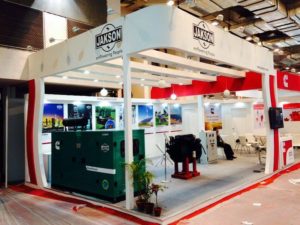CUMMINS DG SETS BHUBANESWAR
DIESEL GENERATORS
Jakson is a pioneer of the diesel generator manufacturing industry in India. The company inaugurated its first manufacturing facility in 1979 at Mayapuri Industrial Area in Delhi with an annual capacity of 60 DG sets.
Jakson offers a comprehensive range of Cummins generators ranging from 7.5 kVA to 3750 kVA in single node that can meet the diverse energy needs of industrial, commercial and individual customers. Jakson DG Sets are the preferred choice of customers across a wide range of industries that include Infrastructure & Realty, IT & ITES, Healthcare & Hospitality, Agrochemical, Automobile, Manufacturing and Agro & Aqua. Our know-how is built on more than 70 years of engineering excellence & our partnership with Cummins, the world leader in Diesel Engines. Jakson silent generators are known for their fuel efficiency, low emissions, superb performance and rugged reliability. Diesel generator price is a bonus with Jakson Group. This is the reason why consumers have chosen to use silent generators manufactured by the Jakson Group over a variety of Diesel Genset manufacturers in India.
Jakson takes pride in being the forerunner of the Indian diesel generator industry and has continued its legacy and excellence over four decades with utmost integrity, innovation, customer centricity, teamwork and care, which are also the company’s core values. We are the pioneers in the diesel generator industry, having introduced the concept of silent generator in India. Together with Cummins, Jakson is a market leader across the low, mid and high-capacity diesel generator market in India.
As the business grew, the company expanded its manufacturing footprint by establishing new plants in Kathua and Daman. The Daman plant was one of the most advanced diesel genset manufacturing units in the country during the early 2000s. To keep up with the growing demand for its silent gensets, the company consolidated its DG Sets manufacturing facilities and today has state-of-the-art manufacturing plants located in Kathua and Kalsar.
DIESEL GENERATOR MANUFACTURING PLANTS IN INDIA BY JAKSON GROUP
Kalsar Plant: Jakson manufacturing plant in Kalsar, Gujarat was established in the year 2011 and serves as an integrated plant for manufacturing acoustic enclosures and DG Sets. The plant has an installed capacity of 11000 generators and 35,000 enclosures annually. It has a total manufacturing space of 3.5 lakh square feet and is spread across 17 acres.
Kathua Plant: Jakson has two manufacturing plants in Kathua, Jammu & Kashmir. These integrated plants are amongst the largest manufacturing facilities in the region and offer employment to hundreds of local youths, leading to considerable economic growth and prosperity in the region. The unit is equipped with state-of-the-art infrastructure to cater to the increasing domestic requirement of DG Sets. The plant is built over 7 acres and has an annual capacity of 2000 Diesel Generators.
HIGHLIGHTS

High Fuel Efficiency
- Our gensets offer high fuel efficiency. Cummins engines are regularly upgraded with new technologies for better performance and fuel economy.

Low Emission Levels
- Our diesel genset product line offers reduced emission levels and adheres to all applicable environmental norms as mandated by the government and other bodies.

24×7 Service Support
- We provide round-the-clock service support across the country. We have the technical know-how to support all kinds of applications.
DIESEL POWER PLANTS
Diesel Power Plants remain the first choice for captive energy generation worldwide. These power plants offer greater reliability and grid-independent operations, increasing the control operators have over their energy needs. It also protects them against all kinds of power outages. Jakson is a leader in diesel power generation. We have the requisite expertise and resources to set up world-class diesel power plants to meet customer needs across industries. We provide complete turnkey services that include site evaluation, installation, operations, maintenance and a proficient after-sales support network. With heavy-duty Cummins engines that are known for their fuel efficiency and dependability, our power plants provide performance that customers need to achieve optimal returns on their investment. Whatever the size or type of application, we have the expertise to deliver tailor-made solutions to fit diversecustomer needs. We combine our engineering expertise with our wide network of dealers and channel partners to deliver optimal solutions to customers across India.
SCOPE OF SERVICES
Now, India is destined to achieve 450 GW of renewable energy installed capacity by 2030. All credit goes to the proactive policies of the Ministry of New & Renewable energy and the commitment to add non-conventional power capabilities to achieve the target of zero carbon emission. Currently, India’s solar power capacity has risen more than five times to 40 GW in March 2021 from 6.7 GW in 2016. This makes solar energy a rapidly growing industry in India and one to watch out for
Still, the non-conventional power alternatives are costly and a handsome share of 280 GW (over 60%) would come from solar. And the Indian Solar industry is heavily relying on imports such as solar cells, modules, and solar inverters. As per the report published by the Standing Committee on Energy in 2019-2020, India has invested around $ 2.5 billion in solar equipment.
Now, the government is taking some serious steps to increase domestic manufacturing through multiple steps includes increasing duty on imports. In this effort, the government announced a basic customs duty of 25 % on solar cells and 40 % on solar modules from April 1, 2022.
In the same vein, under the renewable purchase obligation, consumers like discoms are mandated to purchase a certain proportion of power generated from clean energy sources like solar and wind. But still, a lot needs to be done on this front as India’s domestic manufacturing is not big enough to meet the target of power capacity. So the government needs to increase the scope of their energy vision and is required to tweak it as per the unprecedented demand. Well, it is a nice move to rake up the domestic manufacturing. But the demand to add 25 GW of energy every year is not feasible through domestic manufacturing policy. On the contrary, if India still needs to rely more on imports, then what is the main roadblock in it.
The main roadblock is that the supply and refining of minerals required in the solar and renewable energy systems are limited to some nations. In numbers, China accounts for 60 % of rare earth elements production and holds a great share in the processing of these minerals. On the other hand, South Africa and the Democratic Republic of the Congo hold 70 % of the global production of platinum and cobalt. So for India, that doesn’t have enough stock of minerals required for renewable energy systems. It must have long-term policymaking to get over disputes with the producing nations and make deeper inroads to achieve its renewable energy targets.
Now it is time to highlight some major challenges to the development and deployment of solar energy.
Technological barriers
The low conversion efficiency of solar photovoltaic (PV) technology as compared to conventional systems remains is the biggest challenge. Secondly, PV plants can’t be feasible for immediate response to load demand. Apart from this, regular quality checks are a must for PV module developers and some standards should be in place to improve the quality and lifetime of the PV modules.
Economic barriers
There is a high initial investment cost involved in PV technologies leads to discouragement among organizations to invest in solar technologies. In totality, the cost of PV panel, battery sizing, peak ratings of load are often borne by the consumer. It often leads to an increase in the installation cost and discourages end-users in the technology. So the government needs to be bail out the organizations actively involved in the import of solar equipment and their development.
Environmental barriers
Solar energy is considered a much cleaner resource of energy than conventional energy sources. But still, in the manufacturing process of PV panels, it causes some harm due to toxic compounds in the production lines. The e-waste from PV panels and batteries and its recycling has been a concern to keep this energy 100 % clean.
This is what needs to be done to overcome these barriers
With aggressive approach on R & D and some proper financial schemes to address the loopholes in the financial inflow for PV installations and deployment can aggravate the development process in India. The government can bring some educational programs with the collaboration of many research institutes to increase the scope of research in the area of renewable energy. Setting up designated centers to educate people to aggregate the adoption of solar energy at the ground level.
Conclusion
There is no dispute on the fact that renewable energy is a futuristic approach to meet the energy demands and to meet the pledge of zero carbon emission. However, the Indian government has taken many stringent measures for the development of solar energy. But still, many steps need to be taken to overcome the barriers in the nationwide deployment of renewable energy. Like the nationwide rooftop generation is still a distant dream for India. Fortunately, India has tropical geography, a large market base. If these factors are complemented with attractive policy incentives, innovative technology, financial backing, then India can become an undisputed leader in the global energy market


